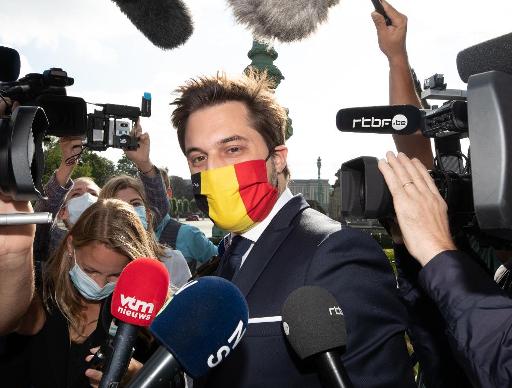Efforts in Belgium to form a federal government are blocked not by regionalism but by a left-right divide, according to the leader of the Francophone liberal MR party, Georges-Louis Bouchez.
"The country is not blocked because of any opposition between Francophones and Flemish people,” Bouchez said in a long interview with L’Echo, published on Friday evening. “The split is not North-South, it’s between left and right,” he said, adding that he was “quite certain” Belgium will have a full-fledged majority government by 17 September.
“There is no majority to form a government of the right,” Bouchez said. “There isn’t a majority to form a government of the left either. What is blocking everything is the emergence of the populists, the PTB-PVDA (far-left) and Vlaams Belang (far-right). What people forget is that only populism won at the last elections, and forming a government is very complicated when there is no winner.”
Pointing to developments since the elections, he added: “I recall that it is I who brought the N-VA (Flemish rightwing) to the table, the CD&V (Flemish centrist) too, by the way, because the MR wanted to respect the results in Flanders. We’ve really been rewarded, that really makes you feel like helping people!”
Related News
- King appoints 12th person in latest attempt to form Belgian government
- Government talks collapse, King makes the next move on Monday
Referring to the discussions between the leader of the French-speaking socialist PS party, Paul Magnette, and leader of N-VA, Bart De Wever, which ended in failure, Bouchez commented: “If you have an agreement between two parties and you are unable to make it move forward with regard to the others, then you do not have an agreement.”
So, what next? For MR, what counts is the programme, the Bouchez noted. “If it’s about going with a community-focussed N-VA, that’s very complicated,” he argued. “If it’s about going with an N-VA that wants to lower taxes, reward work better and extend work like the Swedish [coalition], be my guest!”
The Swedish coalition in Belgium refers to the coalition between the N-VA (yellow), liberals (blue) and CD&V (catholic), whose primary characteristics (yellow, blue, cross) together make up the Swedish flag, in a tradition in Belgian politics to use parties’ colours to design a ruling coalition.
More generally, a government-formation mechanism may need to be established “to prevent the situation from degenerating.”
“One could perhaps report to Parliament after six months and the legislators would decide whether there would be a new vote or not,” he suggested.
The Brussels Times

